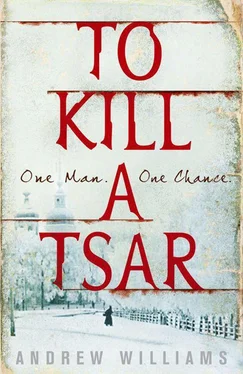‘I do,’ replied Dufferin with a polite smile.
‘Actually, we’re looking for one woman in particular,’ von Plehve continued. ‘A revolutionary called “Romanko” who a witness places in Palace Square when the attempt was made on His Majesty’s life. An associate of a fellow called Mikhailov.’
Von Plehve told them a little of Alexander Mikhailov, of his privileged background, and that he had given agents the slip only a few weeks before. ‘We know he attended a gathering of nihilists in Voronezh in June and that he was one of those who championed a campaign of terror.’
‘This new group,’ said the princess, ‘what do they call themselves?’
‘“The People’s Will”.’
‘You are so fortunate, Lord Dufferin,’ the princess said, ‘that you don’t have people like this in your country.’
‘We have our Irish Republicans.’
‘And what is your opinion, Doctor?’ von Plehve asked, turning to fix Hadfield with his curiously intense stare.
‘My opinion of what, sir?’
‘Of our revolutionaries.’
‘I’ve learnt as a doctor to avoid controversy,’ Hadfield said smoothly. ‘My opinion might have a detrimental effect on a patient’s blood pressure, which would be unforgivable — not to mention unprofitable.’
‘Ha! There you are, Count! Admirably discreet,’ said Dufferin, raising his glass to Hadfield.
‘Admirable, I’m sure,’ von Plehve replied with a taut smile. ‘But can you trust a man who refuses his opinion?’
‘You can trust me to give you a frank opinion of your health, Count.’
‘Don’t persecute the doctor,’ said the princess, shaking her finger at von Plehve. ‘I for one applaud his discretion.’
The count smiled and gave a magnanimous little bow.
‘What do these people want, Count?’ the princess asked.
‘The People’s Will? They want to put the government of our country in the hands of illiterate muzhiks.’ Von Plehve paused to consider his next words carefully, a frown creasing his high forehead. ‘If our intelligence is correct, some ruthless fanatics have joined the group — men like Mikhailov — and others.’ Then with a brightness that seemed a little forced: ‘But we have good people working on this case, rest assured, we’ll find them.’
Glancing up at the windows of the candlelit ballroom an hour later, Hadfield smiled to himself. A friend to ambassadors and princesses, as discreet as the pure white plaster figures gazing down upon one more perfectly ordered scene in which they belong and yet remain apart. The disquiet he had felt when the count had so pointedly asked for his opinion was gone, and he was conscious of a certain satisfaction at straddling two mutually hostile worlds.
Dobson had wanted to know everything von Plehve had said. ‘You’re fortunate in your family connections,’ he grumbled.
Hadfield had told him of the chief prosecutor’s fears, of Mikhailov and his associates, and of the new party — The People’s Will — confident his friend would be discreet. But there were pieces of the conversation and thoughts he kept to himself. As he walked along the embankment towards Palace Square they swirled through his mind like the dark waters of the Neva. Where was the woman he knew as Miss Anna Kovalenko?
6 NOVEMBER 1879
Anna had visited the cottage a dozen times before, but the winter days were drawing in and by five o’clock the rough path from the cemetery was almost lost in the spectral blue light that lingers after sunset. Walk towards the silhouette of the church tower — it was plain enough to her left — cross the track, then follow the monastery wall away from the village. It was the path the day labourers at the Moscow factories were accustomed to taking home. Half an hour and they would begin emptying from the trains at the local station. She needed to be quick: a young woman struggling with a heavy bag at twilight would arouse interest, even a little suspicion. Anna had lived most of her life in a village and understood that anything remotely out of the ordinary was a cause for comment in a small community — and Preobrazhenskoe was more tightly knit and warier of outsiders than most. It was a poor quarter on the southern edge of Moscow, and for many years a refuge from persecution for Old Believers who scraped a living from small allotments, growing fruit and vegetables to sell in the city markets. They did not welcome strangers. Alexander Mikhailov had given strict orders that movement to and from the cottage should be kept to a minimum. Nothing should be said or done to antagonise their neighbours. Some of Anna’s comrades dismissed the Old Believers as fools and laughed at their strange ways: who in his right mind would account it a sin for a man to shave? But Anna had a grudging respect for the sincerity and dignity with which they clung to their faith and their traditional forms of worship. Surely there would be a place for Old Believers in the Russia the new party was fighting for, freedom from persecution, from prescription? For all that, she was as careful to avoid contact with them as the others. Mikhailov knew he could trust her. Most of the members of the new party had no idea how to make themselves anonymous in a village like Preobrazhenskoe.
At the corner of the monastery wall she stopped to catch her breath, placing the white canvas sack carefully on the ground at her feet. An old man, his grey beard tucked into a belted shirt, was plodding along the track, a wooden hoe in one hand and a bag of vegetables in the other. He glanced sideways at her but walked on without a word or gesture. Beyond the wall, a thick belt of waste ground, a patchwork of small market gardens and spoil heaps, and at intervals, the outline of a tumbledown house, a faint light flickering in the window. The little one-storey cottage the party had bought was at its edge, just a stone’s throw from the main railway track to Kursk and all points south. With no small effort, Anna swung the sack back on to her shoulder and set off again, head bent low over the path of beaten earth. She stumbled on for five minutes, her dress catching on a tangle of brambles, concentrating hard on where she placed her feet, glancing up only to be sure of the dim light at the window of the first house. So anxious was she not to lose the path, she did not hear their footfalls or see the men approach until they were only a few yards from her. As they loomed out of the darkness, the sack almost slipped through her fingers and she gave a little gasp of surprise.
‘Did we make you jump, love?’
Three men. Young men. Railwaymen or tinkers. Their faces lost beneath peaked workmen’s caps.
‘You surprised me, yes,’ she said as calmly as she was able.
‘Where are you going? Here, we’ll help you with that.’ The man nearest to her held out his hand. He was broad, his beard too short for an Old Believer, a thigh-length jacket and boots, and as he bent closer she could smell beer on his breath.
‘Pretty…’ one of his companions muttered.
‘My friend likes you, love,’ the first man said. His hand was still open in front of her.
‘Then he won’t mind stepping out of my way, will he?’ This time there was steel in her voice. She was angry. Who were these men to accost a woman at night?
‘I’m sure he would be happy to do more for you than that,’ replied the first man, turning for approval to his companions who were sniggering like smutty children.
‘Let me pass!’ She took a step forward.
‘Now, now. We’re only being friendly.’
They were not going to let her go. What did they want? Was it just the bag? Her heart was pounding but her mind was crystal clear.
‘My husband and his friends are in that house there,’ she said, retreating a step. ‘Hey, Mishka! Thieves! Thieves!’
Читать дальше












